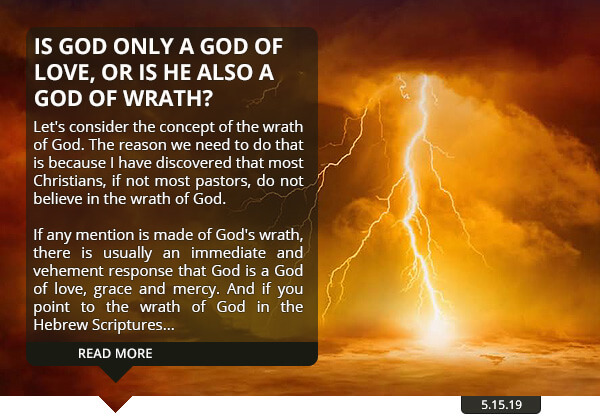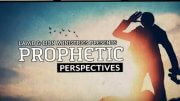
Let’s consider the concept of the wrath of God. The reason we need to do that is because I have discovered that most Christians, if not most pastors, do not believe in the wrath of God.
If any mention is made of God’s wrath, there is usually an immediate and vehement response that God is a God of love, grace and mercy. And if you point to the wrath of God in the Hebrew Scriptures, as, for example, when He destroyed the world with the Noahic Flood, the response usually is, “But that was the God of the Old Testament. The God of the New Testament is a God of grace, mercy and love.”
One of the most memorable times when I encountered this attitude was in about 1995. I was contacted by the producer of a popular radio talk show in Oklahoma City. He said the host of the program had seen an article I had written about the financial accountability of Christian ministries, and he had liked it. He wanted to interview me about it. I agreed to the interview.
The host began the interview by graciously giving me the opportunity to summarize the fundamental message of my ministry. I responded by saying that God had called me to proclaim “the soon return of Jesus.”
I then explained that this message was like a two-edged sword, with a message for both believers and unbelievers. I pointed out that the message for believers is to commit themselves to holiness and evangelism. I then added, “The message for unbelievers is to flee from the wrath that is to come, by fleeing into the loving arms of Jesus now.”
Before I could proceed with my explanation, the host cut me short. “What do you mean when you refer to ‘wrath’?” he asked.
“I mean that Jesus is going to return very soon to pour out the wrath of God upon those who have rejected God’s love and grace and mercy.”
He responded by saying, “I happen to be a Christian, I go to church every Sunday, and I have never heard anything about God ‘pouring out wrath.’ My God is Jesus, and He wouldn’t hurt a fly!” Then he literally yelled at me, “Your God is a monster!”
That was the end of the interview. He hung up on me. I was not given an opportunity to respond to his misrepresentation of our Creator. If I had been given a chance to respond, I would have quoted the warning Jesus gave in the book of Revelation to the church at Thyatira which was tolerating a false prophetess who was corrupting the whole church. Jesus warned:
20) “But I have this complaint against you. You are permitting that woman — that Jezebel who calls herself a prophet — to lead my servants astray. She teaches them to commit sexual sin and to eat food offered to idols.
21) I gave her time to repent, but she does not want to turn away from her immorality.
22) Therefore, I will throw her on a bed of suffering, and those who commit adultery with her will suffer greatly unless they repent and turn away from her evil deeds.
23) I will strike her children dead. Then all the churches will know that I am the one who searches out the thoughts and intentions of every person. And I will give to each of you whatever you deserve.” (Revelation 2:20-23 NLT)
These verses pretty well destroy the concept of a meek and mild Jesus who wouldn’t hurt a fly!
Of course, I could also have pointed to the fact that the Tribulation begins with Jesus Himself launching the Seal Judgments. In fact, in Revelation 6:16, those judgments are referred to as “the wrath of the Lamb.”
Let me give you another example that occurred more recently, in 2005. It is the example of an enraged pastor.
I was invited to speak to a large church in the Dallas area where I had spoken several times before. The date of my presentation fell on a Sunday about three weeks after hurricane Katrina had devastated New Orleans.
I decided I would speak about the hurricane, with the intention of pointing out that I believed it to be a remedial judgment of God upon this nation for two reasons. The first reason I mentioned was our nation’s strong-arming of Israel to surrender the Gaza Strip to its enemies. I noted that the hurricane had started forming very suddenly near the Bahamas on the last day of the Israeli withdrawal.
The second reason I gave was the immorality of our nation and particularly the city of New Orleans, a city that calls itself, “Sin City USA.” The hurricane hit the city just as it was preparing to conduct its annual festival called “Gay Mardi Gras.” The 2005 theme of this sexual orgy was “Jazz and Jezebels.” In 2004, the event had attracted 125,000 revelers who proudly flaunted their perversion publicly in a garish parade. The event was sponsored by a group called, “Southern Decadence.”
All hell broke loose during the following week. You see, the pastor was out of town when I delivered the message. When he returned home and watched a video of the message, he went ballistic! He even checked my speaking schedule on our website and called the next church where I was to speak and warned them about allowing me to present my sermon.
What was he so mad about? Two things. First, he felt it was wrong for me to attribute a disaster to God when it should have been assigned to Satan. Second, he objected to my characterization of the hurricane as being a manifestation of the wrath of God. He insisted that the “God of Wrath” was the Old Testament God, whereas the God of the New Testament is a “God of Grace.” The idea of God pouring out His wrath was entirely foreign to him.
These are only two examples of many experiences I have had where Christians have reacted with revulsion against any mention of God’s wrath.
Four points need to be made concerning the modern day Church’s view of God — four very important points:
1) We need a balanced view of God.
Yes, He is a God of love, grace and mercy. But He is also a God of holiness, righteousness and justice. The prophet Nahum provides us with that balanced view: “The LORD is good, a strong refuge when trouble comes. He is close to those who trust in him” (Nahum 1:7). That is the God of love, grace and mercy.
But consider what else Nahum has to say about the nature of God (Nahum 1:2-3):
2) The LORD is a jealous God, filled with vengeance and rage. He takes revenge on all who oppose Him and continues to rage against his enemies!
3) The LORD is slow to get angry, but his power is great, and he never lets the guilty go unpunished.
2) The second thing we need to keep in mind is that God has not changed.
There is no such thing as “the God of the Old Testament versus the God of the New Testament. God has always been a God of love, grace and mercy, just as He has always been a God of holiness, righteousness and justice.
God is immutable. And that means He never changes. He declares this in Malachi 3:6 where He says, “I, the LORD, do not change.” The point is reiterated in the New Testament in Hebrews 13:8 where it says, “Jesus Christ is the same yesterday, today, and forever.”
3) The third thing we need to understand is that because He is a God of holiness, righteousness and justice, He is going to deal with sin.
I’m convinced that most people think of God as a Cosmic Teddy Bear who winks at sin. That is not the true God of the universe. The Bible makes it crystal clear that God takes sin very seriously and that He deals with it in one of two ways: Grace or Wrath.
Everyone knows John 3:16; few seem to be aware of John 3:36, taken from a sermon of John the Baptist: “He who believes in the Son has eternal life; but he who does not obey the Son will not see life, but the wrath of God abides on him.”
4) The fourth thing we need to understand about God is that He is sovereign.
God is on His throne. He is in control. Psalm 2 says he laughs at all the plots and schemes of the world’s political leaders. He is not laughing because He does not care. His laughter is provoked by the fact that He has the wisdom and power to orchestrate all the evil of Satan and Mankind to the triumph of His Son.
People like to attribute all bad things to Satan. But the interesting thing is that the Bible never does that because the writers believed in the sovereignty of God. They therefore understood that when bad things happen, God allows them either to discipline us or to refine us in righteousness — or for purposes known only to Him.
Satan is not free to do as he pleases. The book of Job makes this clear. Satan could not touch Job or his household or his possessions without God’s permission, and even when that permission was granted, Satan was told he could not take Job’s life.
Some people argue that the first half of the Tribulation will consist of the wrath of Man and Satan and that the wrath of God will be manifested only in the Bowl Judgments that occur near the end of the Tribulation. But that is not true.
Even during the first half of the Tribulation, when Satan and the Antichrist will be rampaging around the world, they will do so under the sovereignty of God. They will be used by God as instruments of His wrath, just as the Babylonians were used by God to pour out His wrath on Judah (Habakkuk 1:5-11).
This begs the question: “Are you saved and so are living under God’s mercy, or are you still living in rejection of Jesus Christ and so remain under God’s wrath?” Your decision will have eternal consequences.
Read the entire article “Judgment in Jehoshaphat” on our website!



